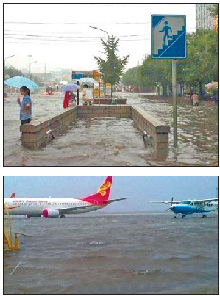|
 |
| Top: Pedestrians stand by an underpass in downtown Beijing in July, 2004. The photo was posted on micro blogs by netizens who claimed it was taken after a downpour that hit Beijing on June 23. The claim was later proven false. Above: The micro-bloggers posted this photo, claiming it was of Beijing Capital International Airport. In fact, the photo was actually of an airport in Hainan province. Many websites, such as the Sina Weibo, opened micro blogs to expose false rumors. | A popular micro-blog posting that features seven photos of a heavy downpour in Beijing on June 23, three of which have been proven fake, has triggered public concern about the spreading of Internet rumors.
The seven pictures, named "The Seven New Sights in Beijing", showed water submerging cars on the streets, drainage water backed up into the Taoranting subway station and other scenes of flooding after the rainstorm.
 But two of the photos were released in 2004, and one purportedly showing Beijing Capital International Airport flooded by deep water was actually an airport in southern China's Hainan province, a report of the State broadcaster China Central Television (CCTV) said on Friday. But two of the photos were released in 2004, and one purportedly showing Beijing Capital International Airport flooded by deep water was actually an airport in southern China's Hainan province, a report of the State broadcaster China Central Television (CCTV) said on Friday.
"They (the people responsible) intended to attract more followers," said Tan Chao, leader of the department at Sina Weibo, the popular Chinese micro-blogging site, that exposes and reports false rumors.
Vast amounts of information from individuals and organizations are released on the Internet every day, and much of it is false.
"The Internet is open to everyone, so everyone has access to a means of information," Qian Jun, a lawyer in Yangke Law Firm, told China Daily.
"This characteristic of the Internet makes the fake news unavoidable."
After contaminated water from the ruined nuclear plants was released into the sea following the severe earthquake and tsunami that hit Japan on March 11, rumors circulated on the Internet and by other means in many cities in China that sea salt was unsafe for consumption.
This triggered panic-buying of iodized salt among residents in a number of cities, such as Beijing, Hangzhou and Changsha. The salt was rumored to protect people from radiation.
Citizen's right to express themselves should be protected, but if their speech violates others' legitimate rights and interests, they should be punished, Liu Deliang, a professor at Beijing Normal University law school, said on Friday.
"The websites have the responsibility to monitor information released on their sites, removing postings that may have severe consequences, and clear up rumors," Qian Jun said. "Netizens should also exercise judgement."
Qiu Shanhan, a Sina Weibo micro blog fan since 2009, told China Daily: "I noticed the news and photos about the heavy rain in Beijing through my micro blog account and also forwarded many pictures that shocked me at first. But I didn't believe all of them."
Many websites, such as the Sina Weibo, opened micro blogs to expose false rumors.
"Though spreading fake news may cause some chaos, expression on the Internet should be encouraged for further development," said Zhan Jiang, a professor of journalism at the School of English and International Studies under the Beijing Foreign Studies University.
"At the same time, more laws and regulations should be made to prevent fake news." |

